Here is some information that might make traveling around Japan by motorcycle easier for you.
First of all, Japan has six times the population of Australia in a land area 1/20 the size. Traffic can be very heavy, especially in cities. You should plan to only travel about 300 km a day unless you use the expensive expressways. Don't expect to cruise all day at 100km/h on surface roads, it won't happen (trust me)! Also, many cars are on the roads everywhere during the spring (first week of May) and summer (mid. August) holidays.
Traffic rules
First of all, we drive on the left side of the road in Japan. That is the most important rule!
Other things you may want to know:
・ Stop at all railroad crossings, even if no train is coming.
・ Japanese drivers tend to run red lights when they change from green to red. Look before going when your light turns green.
・ Speed limits are lower than most countries. Sorry!
・ Parking is difficult in large cities. Don’t park you bike near a train station in a large city, the police will give you a ticket.
Signs
These are some signs that you may not know.

Stop
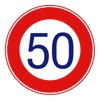
Speed limit 50 km/h
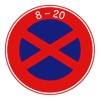
No stopping (8 am to 8 pm)
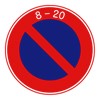
No parking (8 am to 8 pm)
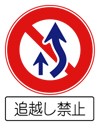
No passing
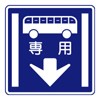
Bus lane (busses only)

National highway
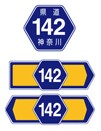
Prefectural road
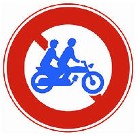
No pillion/tandem/two-up
Expressways
Japan has a large toll expressway network. However, this is very expensive (about 20 yen per km). Expressways are useful for getting in and out of crowded major cities, though.
How to use:
If there is a ticket machine, take a ticket and pay when you exit.
If there is a person at the toll booth where you enter, pay the fee for that section.
Caution:
Japan has introduced Electronic Toll Collection (ETC). Travelers’ bikes do not have ETC devices, so you cannot use the ETC lane (the bar will not go up!). Stopping in the ETC lane is very dangerous, so be careful not to use the ETC-only lane.
Check for these signs at the toll gate

ETC ONLY (do not use this lane)

ETC and non-ETC (OK to use this lane)

non-ETC lane (OK to use this lane)
Japanese words and phrases
Here are some helpful words and phrases for traveling by motorcycle in Japan. For more general phrases, please get a regular phrase book.
Full tank of regular (premium) gasoline please.
Regular (haioku) mantan
レギュラー(ハイオク)、満タン
I will pay in cash (by credit card).
Genkin (kado) de
現金(カード)で
Excuse me. Please tell me how to use this.
Sumimasen. Tsukai-kata wo oshiete kudasai
すみません、使い方を教えて下さい。
Where is XXX?
XXX wa doko desu ka?
○○はどこですか?
Can I camp here?
Koko de kyanpu shitemo ii desuka?
ここでキャンプしても良いですか?
Can I park my motorcycle here?
Koko de baiku wo tomete ii desuka?
ここでバイクを止めてもいいですか?
I have a flat tire
Panku desu.
パンクです。
The engine will not start.
Enjin ga kakarimasen.
エンジンがかかりません。
Words
motorcycle shop
baiku-ya
バイク屋
police
keisatsu
警察
ambulance
kyu-kyu sha
救急車
map
chizu
地図
Gasoline/Petrol
Gasoline in Japan is generally more expensive than the USA, but cheaper than Europe. Usually, gas stations offer three types of gasoline: Regular (red pump), Premium (yellow pump), and Diesel (green pump). Regular is about 90-95 octane (RON), and premium around 100 octane (RON). Octane levels differ by gas station, and the attendant usually doesn’t know the actual level; so don’t bother to ask.
Many stations are full service, but self service stations are becoming very popular. Self service is a few yen cheaper, but the machines are very complicated if you don’t understand Japanese. Ask for help. See Japanese words and phrases for how to ask for gasoline at the gas station.
Caution: Many gasoline stations are closed on Sunday, especially in the countryside. Fill your tank on Saturday evening, or you may not be able to go far on Sunday!
Navigation
Maps
Most of maps will be in Japanese language only. However, the Touring Mapple series of atlases for motorcyclists has most city and town names in English too. These are separated into seven different books by region, and are available at most bookstores. An all-English atlas available is Road Atlas Japan, but is may not be available at smaller bookstores.

Sign for a bookstore
Road signs showing directions to cities are often in Japanese and English. But not always…
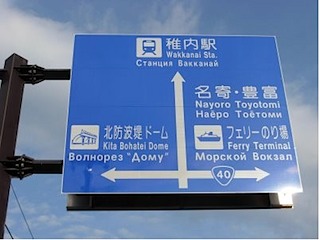
Signs even have Russian in Wakkanai City!
GPS
Japanese Garmin GPS maps will not work on foreign GPS receivers. You can purchase maps in English from Upupdown. Or try OpenStreetMap.
Money
Japan is very much a cash society. Many larger shops now accept credit cards, but a small bike shop may be cash only. So, be sure to carry plenty of cash! You can exchange money at most banks, but you cannot use foreign ATM cards at most banks. However, foreign bank cards are accepted at many post offices and 7-11 convenience stores.

Foreign ATM cards can be used only at the post office and 7-11!
Japan has a wide range of lodging available from camping to luxury hotels. You can actually camp just about anywhere in Japan, as long as you do not be a problem for others. Put up your tent just before dark, and wake up early (the sun comes up before 5 am in the summer here). This list has a few hostels, etc. at low prices (for Japan).
The cheapest places to stay in Tokyo are in the Asakusa area. That is in the center of the city and one of the poorest areas. Your bike should be safe on the street, but don’t leave your luggage on the bike outside overnight. In Kyoto, Osaka, Takayama, and Hiroshima J-Hoppers guest house is popular and owned by a motorcycle traveler.
Youth hostels are another option. They are more accommodating to foreign guests, but they can cost as much as a business hotel if you are not a member.
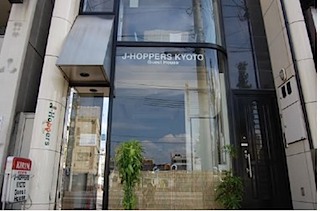
Guest houses and hostels can be found in major cities.
Helpful phrases:
How much does it cost for one night?
Ippaku ikura desu ka?
1泊いくらですか?
Do you have a room available?
Aiteiru heya wa arimasu ka?
空いている部屋はありますか?
Eating
Many types of food are available in Japan. However, vegetarian dishes are not very common. On the road, you will find noodle shops, rest stop cafeterias, beef bowl shops, and even McDonald’s! Convenience stores also have ready-to-eat meals.

Ramen noodle shop sign
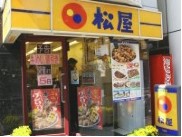
Matsuya beef bowl shop (purchase ticket from machine)
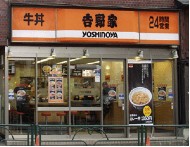
Yoshinoya beef bowl shop (order at the counter)
Communications
Internet
Japanese Internet cafes also provide other services such as comic book libraries and billiard halls. Many require you sign up and pay for annual membership even just to use one time. However, some Internet cafes also have all-night rates, and you can spend the night. Most have free drinks. Some even have showers.
Internet cafes in Japan are not as easy to find as in some countries. Most homes have computers now, so people don’t need to go to the Internet cafe as much. Wi-fi also usually requires passwords, so there is little free public wi-fi.

Sign that says Internet in Japanese
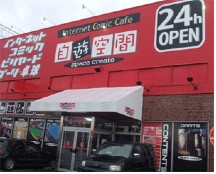
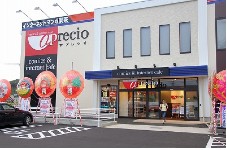
Japanese Internet cafes of major chains
Telephone
GSM cell phones do not work in Japan, only 3G. Check with the manufacturer of your phone. SIM cards alone cannot be purchased. Some places will rent them at the airport. You need an official address in Japan to purchase a phone.
